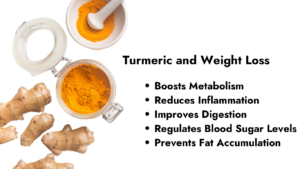Turmeric, often referred to as the “golden spice,” has been a staple in Indian cuisine and Ayurvedic medicine for centuries. Known for its bright yellow hue and robust flavor, this ancient root is praised for its anti-inflammatory, antioxidant, and medicinal properties.
Over the years, turmeric has gained global attention as a potential aid in weight loss. But does turmeric really help in shedding those extra pounds?
Let’s look into the science and explore whether this superfood can support your weight-loss journey.
The Active Component: Curcumin

The magic of turmeric lies in its active compound, curcumin. Curcumin is a polyphenol that gives turmeric its distinct yellow color and potent medicinal properties. Research shows that curcumin plays a significant role in regulating metabolism, reducing inflammation, and improving overall health—all of which can indirectly influence weight loss.
However, one challenge with curcumin is its low bioavailability, meaning the body struggles to absorb it effectively. Pairing turmeric with black pepper (which contains piperine) or healthy fats can enhance its absorption.
Related Read: What Makes Curcumin the Active Powerhouse in Turmeric
The Science Behind Turmeric and Weight Loss

1. Boosts Metabolism
Curcumin is known to activate brown fat (brown adipose tissue), a type of fat in the body that burns calories to generate heat. Studies suggest that curcumin can increase the thermogenic activity of brown fat, thereby boosting metabolism and aiding in fat burning. A faster metabolism can contribute to weight loss by helping the body burn calories more efficiently.
2. Reduces Inflammation
Chronic inflammation is often linked to obesity and metabolic syndrome. Turmeric’s anti-inflammatory properties can help combat inflammation in fat tissues, improving the overall functioning of fat cells. Healthy fat cells play a crucial role in regulating hormones like insulin, which is essential for maintaining a healthy weight.
3. Improves Digestion
Poor digestion and a sluggish gut can hinder weight-loss efforts. Turmeric stimulates bile production in the liver, which aids in breaking down fats and promoting a smoother digestive process. A healthy digestive system ensures better nutrient absorption and reduces bloating, both of which are beneficial for weight management.
4. Regulates Blood Sugar Levels
Spikes and crashes in blood sugar levels can lead to overeating and fat storage. Curcumin has been shown to improve insulin sensitivity and regulate blood sugar levels. By stabilizing these levels, turmeric helps prevent the overeating cycles that often contribute to weight gain.
5. Prevents Fat Accumulation
Some animal studies indicate that curcumin can suppress the growth of adipose (fat) tissue. It does this by inhibiting the development of new blood vessels in fat tissue, a process known as angiogenesis. Without sufficient blood supply, fat tissues struggle to expand.
Incorporating Turmeric into Your Diet

Adding turmeric to your daily routine can be easy and enjoyable. Here are some practical ways to incorporate this golden spice into your diet:
1. Golden Milk
Golden milk, or turmeric latte, is a popular way to enjoy turmeric’s benefits. Mix a teaspoon of turmeric with warm milk (dairy or plant-based), a pinch of black pepper, and a sweetener of your choice (like honey or stevia).
2. Turmeric Tea
Boil water with a teaspoon of turmeric, ginger, and lemon juice to make a refreshing and detoxifying tea. Adding a dash of honey can enhance the flavor.
3. Smoothies
Blend turmeric into your morning smoothie with ingredients like banana, spinach, almond milk, and chia seeds for a nutrient-packed drink.
4. Cooking
Turmeric is a versatile spice that can be added to curries, soups, roasted vegetables, and even scrambled eggs. Pair it with black pepper for maximum absorption.
5. Supplements
If you find it challenging to consume turmeric through food, curcumin supplements are an option. Look for supplements that include piperine for better absorption.
Related Read: Are Turmeric Supplements Worth Taking
What the Research Says

While turmeric shows promise in aiding weight loss, it’s important to set realistic expectations. Most of the studies conducted on turmeric’s weight-loss benefits have been on animals or in controlled environments. Here’s a snapshot of some relevant research:
- A 2015 study published in Biofactors found that curcumin supplementation helped reduce weight gain and fat accumulation in mice fed a high-fat diet.
- A small human study published in Current Developments in Nutrition in 2019 suggested that curcumin supplementation might help reduce body weight, BMI, and waist circumference in overweight individuals. However, the sample size was limited, and further research is needed.
- A 2017 review in the Journal of Nutritional Biochemistry highlighted curcumin’s potential to regulate metabolic processes, but it also emphasized the need for more extensive human trials to confirm its effectiveness.
Limitations and Precautions

While turmeric offers numerous health benefits, it’s not a magic solution for weight loss. Here are some considerations to keep in mind:
1. Moderation is Key
Excessive consumption of turmeric can lead to side effects such as nausea, diarrhea, or stomach cramps. Stick to recommended dosages, especially when taking supplements.
2. Not a Standalone Solution
Turmeric can support weight loss when combined with a balanced diet, regular exercise, and a healthy lifestyle. It is not a substitute for calorie control or physical activity.
3. Interactions with Medications
Curcumin can interact with certain medications, such as blood thinners or diabetes medications. If you’re on medication, consult your doctor before adding turmeric to your routine.
4. Allergies
Though rare, some individuals may be allergic to turmeric. If you experience any adverse reactions, discontinue use and consult a healthcare provider.
The Bigger Picture: A Holistic Approach to Weight Loss
Turmeric can be a helpful tool in your weight-loss arsenal, but sustainable weight loss requires a holistic approach. Here are some tips to amplify your efforts:
1. Focus on Whole Foods
Incorporate a diet rich in fruits, vegetables, lean proteins, and whole grains. These foods provide essential nutrients and keep you satiated.
2. Stay Active
Regular exercise, including cardio and strength training, is essential for burning calories and building muscle. Aim for at least 150 minutes of moderate exercise per week.
3. Manage Stress
Chronic stress can lead to overeating and weight gain. Practice stress management techniques such as yoga, meditation, or mindfulness.
4. Get Adequate Sleep
Poor sleep can disrupt hormones that regulate hunger and appetite. Aim for 7-9 hours of quality sleep per night.
5. Stay Hydrated
Drinking water not only keeps you hydrated but also helps control hunger and improves metabolism.
Conclusion
So, does turmeric actually help in weight loss? The answer lies in its supportive role. Turmeric, particularly its active component curcumin, can enhance metabolic functions, reduce inflammation, and regulate blood sugar levels, all of which contribute to weight loss. However, it is not a miracle cure and works best when paired with a healthy lifestyle.
If you’re considering using turmeric for weight loss, start by incorporating it into your diet through foods and beverages. For those seeking a more concentrated dose, supplements may be an option, but always consult a healthcare professional before starting.
Ultimately, weight loss is a journey that requires consistent effort, patience, and a comprehensive approach. Turmeric can be a valuable ally in this journey, but remember, the key to success lies in balance and sustainability.

